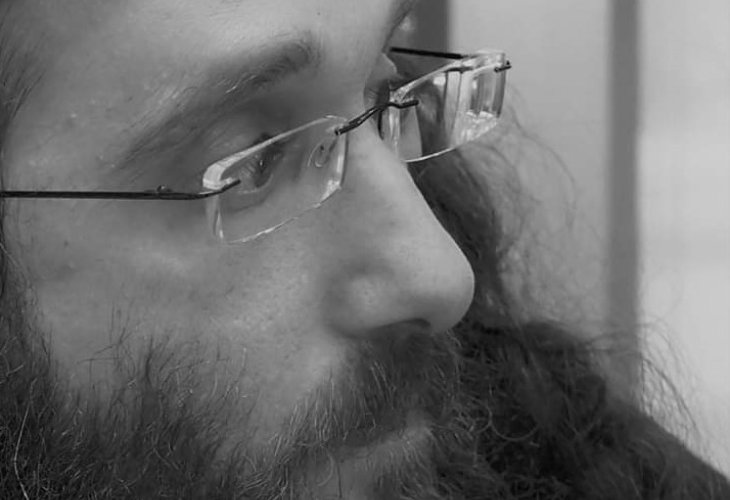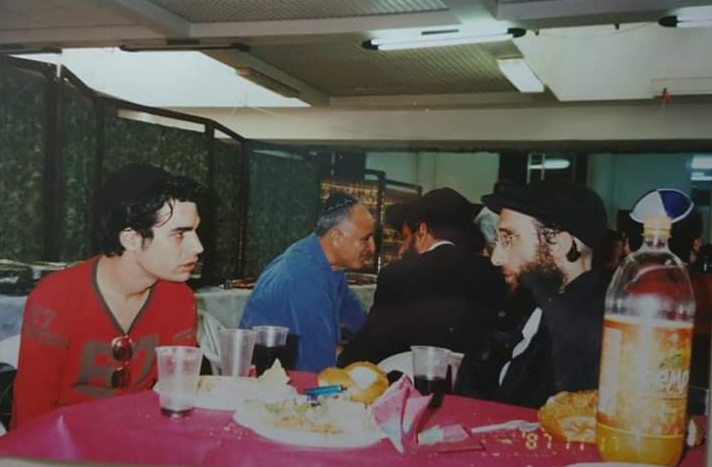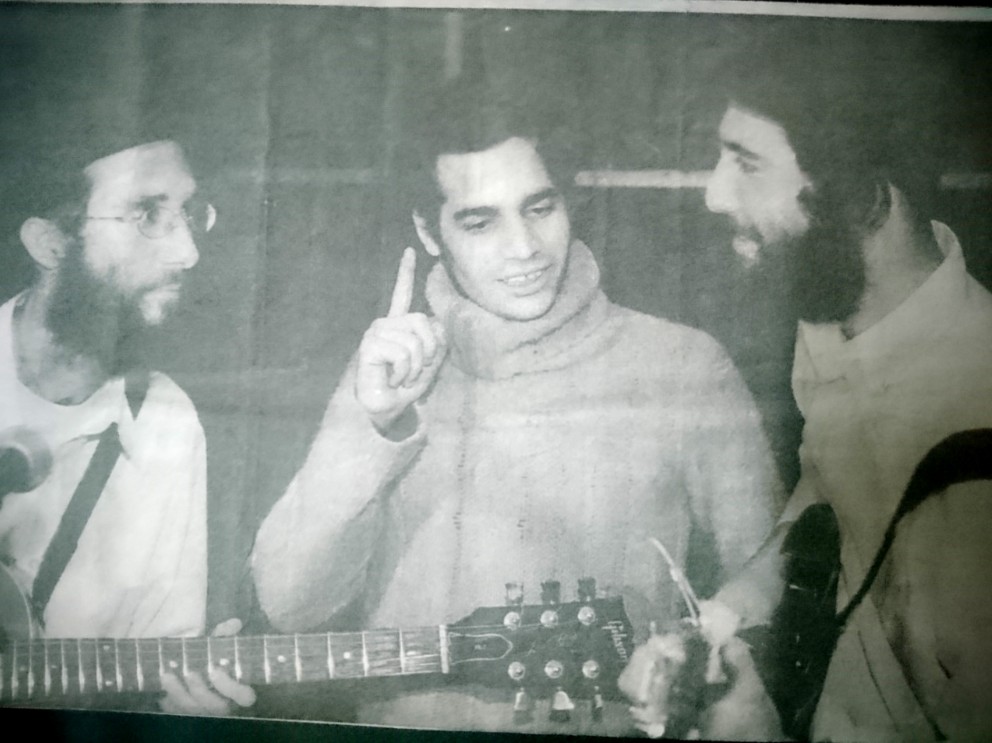"I Gave Up What I Wanted Most, but I Understood I Was Sinning and Leading Others Astray"
Amir Vahaba, a veteran artist and ba'al teshuva, shares his unique connection to music, the unexpected breakup of his band, a surprising call from Aviv Geffen, his complex journey of repentance, and his hope that his songs will finally break out after 20 years of writing.
 Amir Vahaba
Amir VahabaOn my way to meet with artist Amir Vahaba, by twist of fate, I hear from a senior figure in Israel's music industry that the annual concert of the 'Ezra Lemarpeh' foundation, led by Rabbi Firer, is in danger of being cancelled. It turns out a storm in a teacup brewed because all the invited singers to this concert are men, leading to allegations of female exclusion and misogyny from all sides. Twenty years ago, Vahaba and his brother, fresh ba'alei teshuva, continued to pursue their love for music but with sanctity, until one day, a surprising phone call came from Aviv Geffen.
"We Refused to Perform in Mixed Audiences"
"I had a progressive rock band in Tel Aviv," says Vahaba, 47, married and a father of 11 children living in Jerusalem, currently working at a leasing company while continuing to create independently. "But thanks to returning to faith, the band broke up, and so I returned to Ashkelon, my hometown. My brother and I rented an apartment there and started working on 'Lights and Vessels,' our first album as ba'alei teshuva."
"The album was released, and by divine providence, it reached Aviv Geffen, who was very impressed by it. Aviv called, said he loved what he heard, and wanted to meet to explore collaboration. Aviv wanted to re-produce the album at Helicon, with a higher budget than what we had, and we wanted to hear what he had to offer."
Surely you were curious about what caught Aviv's attention about your album.
"Yes, we talked about it, and he said he loves powerful music, and ours was such in his eyes. Besides, he was intrigued by the fact that we are religious charedi Jews making music, walking around with sidelocks and beards while playing rock. We met at his house in Tzahala, then also in studios, and everything was becoming very serious. Aviv didn’t touch the lyrics and melodies, only the arrangements and musical production. Things progressed, we reached 'Helicon' to sign the contract, and in the middle of discussions and negotiations, Aviv asked us to warm up at one of his upcoming shows."
"We thought about it and told him we had a problem performing before a mixed audience. That we couldn’t do it. The answer didn’t sit well with him, and he said that to continue together we have to do it. He was counting on us, on our success, and understood that if we don’t perform mixed – it blocks a lot of things for us. We were relatively early in our teshuva, and after further thought I told him we’d perform mixed, provided we ask the audience not to dance before the show."
"Aviv didn’t agree to our proposal, and our performance was cancelled. From that point on, the collaboration between us started to decline, as Aviv understood we wouldn’t perform in front of a mixed audience. Shortly after, the connection was completely severed. We continued making albums, albums for the drawer, because we knew we were paying a price for our decision in terms of success. We understood that success has a price – a price of mixed performances, publicity, of reaching not the most kosher places, so we decided to focus on our Torah study, on our teshuva, and said goodbye to the huge aspiration to break out with our songs and become famous."

New Age on Shenkin
According to Vahaba, his connection to music started at a very young age and accompanied him through all stages of his life. "I was born in Ashkelon to a traditional family," he says, "mainly observing kiddush on Shabbat, celebrating the holidays, and not much beyond that. From a very young age, I loved being alone, and my entire world revolved around music. Very quickly I understood that music was the main thing in my life. For instance, at age 15, I often traveled to various holes just to buy rare records. At the same time, I taught myself to play music and, thanks to a music column published in a newspaper, expanded my knowledge in the field."
"Additionally, I was always listening to music. It was always in the background. Even when I went to sleep – I would play a record and fall asleep with it to listen to music before and during sleep. Beyond that, all my social connections were around music. I was writing and composing songs, and that's how I mingled with bands. Books, films, nothing interested me. Only music."
"The musical style I connected most to was rock, especially alternative rock. After high school, I enlisted in 8200 and served in classified listening departments because I had a background in Arabic from home. My parents immigrated from Egypt, and thanks to this, I know Arabic. After my discharge, I rented an apartment with friends in Tel Aviv, formed a band with some musicians, and held small performances. We mainly played progressive rock pieces of 7-8 minutes and wanted very much to become famous. Until then, at no point in my life was I interested in the spiritual quest. But it burst out just then. Alongside investing heavily in the band, I was also drawn into the spiritual search."
What sparked the desire for a spiritual quest in you?
"During that post-discharge period, I began to realize there are things, even though we don't see them, that exist and influence. I understood there are things beyond. In those years, there was a strong buzz about the 'New Age,' and it caught me too. There were several stores in Tel Aviv selling books about the subconscious, the idea that there is no randomness in the world, and it spoke to me a lot. Although at first, I studied eastern philosophies and was still not exposed to our Torah, I began recognizing spiritual worlds, which was unfamiliar to me until then."
"I continued progressing with it, and then, by Hashem's grace, the book 'Sha'arei Orah' by Rabbi Yosef Gikatilla came to my possession. The book discusses the spherot, the holy names, and more, and it particularly grasped me. In essence, it finally connected me to the spiritual world of Judaism, after what I learned elsewhere. At that stage, I wasn’t yet involved in halacha, only in Kabbalah. Thanks to this book, I started to understand better the concept of the secrets of the holy language letters by which, according to Kabbalah, Hashem created the world."
"After understanding this, a significant door to teshuva opened for me. I reached such a level of clear knowledge regarding the truth of the Torah that I threw away all eastern philosophies and decided to do teshuva properly, to learn Shulchan Aruch, and to keep halacha. I realized that if these letters, with which the Torah is written, are how the world was created, then everything is true. I understood that I should go in the path of truth. I was then 24 years old, living in Tel Aviv, heavily invested in the band, and suddenly I brought the guys unusual songs with words they didn't know or understand. I suddenly also came to them with a beard. Shortly after, the band broke up, and each of us went our separate ways."
 Photo: Osnat Krasnansky
Photo: Osnat Krasnansky
The Kippah Barrier Challenge
One of the topics ba'alei teshuva often discuss, either with regret or gratitude for the insight they had or lacked at the beginning of their teshuva, is the pace of their progress in observing mitzvot. In this regard, Vahaba shares with great satisfaction about the measured and gradual path he took. "I remember the fear, the apprehensions that suddenly you understand you are going to change your entire life. That almost everything you knew – is going to be different. In those days, it was clear to me I couldn’t make this change from zero to a hundred in a few seconds. Unfortunately, today we see quite a few issues that arise when ba'alei teshuva 'go too fast' on themselves or Hashem."
How did you know how to balance it? And what did you do in practice?
"The truth is I mainly found the balance by self-listening. Introspection into what was happening within me. Only when I genuinely felt ready did I move to the next level. It doesn’t mean I wasn’t scared before moving up, but I felt ready. These are things a bit hard to explain in words. By the way, the kippah stage was one of the hardest. When you put on a kippah, you can’t play with it anymore. Before that, you could tell people you’re interested in halacha, checking, reading, but putting on a kippah is already a completely different matter. The kippah declares: 'I am religious. I am in.' So, it’s a very difficult decision. Additionally, you also think about how people will react. In the end, it really surprised those close to me, and they didn’t easily accept it. One of the things that made it easier for me in this regard was that my younger brother and I returned to teshuva together. In essence, after overcoming the kippah barrier, everything was much easier."
I suppose one difficulty was consciously giving up musical creation.
"Certainly. I understood that following my choice to walk in the path of truth I would have to pay a price, mainly concerning music. The truth is, I never abandoned it, my brother and I continued writing and recording songs, but everything was kept in a drawer, and we’ve been doing this for twenty years. Indeed, I gave up what I wanted most, but when you understand you are sinning and leading others astray, the choice is easy. Quite often thoughts arise about maybe doing it differently, but I don’t regret anything because everything is for the best by Hashem."
"For me, performing before a mixed audience, which at best sits and at worst dances, is a red line I’m not willing to cross. To my understanding and feeling, this matter is very severe. Therefore, in my view, it is jarring that certain artists perform before mixed audiences. These are artists who manage to connect Jewish content with super high-quality, advanced production, but the mixed performance point diminishes their great achievement. It’s a shame serious religious artists perform mixed because if they invested and insisted on it, they would succeed. Their audience would come anyway. They have power, and they’re not using it."
Beyond the halachic matter, nowadays there is also a legal and public issue with holding separate performances.
"That is entirely bizarre to me. Why are people opposed to separate performances? Ostensibly because of the exclusion of women. But people don’t realize that even in mixed performances there is exclusion – excluding those who don’t come to mixed performances. This matter needs to be discussed, and in my opinion, religious artists, particularly ba'alei teshuva artists, should insist on this point. I don’t think there is a halachic authority, someone among the greats of the generation, who permits performing mixed. Who guarantees us the audience won’t stand, dance, and mix?"
How do you personally plan to act on the matter?
"As I mentioned, my brother and I have been recording for twenty years for the drawer, but now we are going public. Now the drawer is opening. We have set up a website where you can find many of our materials. All my life I dreamed of my music breaking out, and I hope now it will happen. I want our songs to be published, touch people, and we are also currently working on a new album. I hope we manage to do it most professionally, with very high-quality production, and of course, with Jewish content. We very much want to break out and succeed, but only in a kosher way. That our art should be according to halacha. We aspire to touch people, strengthen them, and of course perform – but only with separation – for the honor of Hashem."

